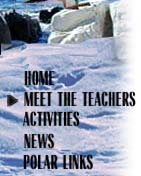November 26, 1995
Location: 65 50 South Latitude x 117 39' West Longitude
Update:
At 12:00 AM local time at the start of my watch, a welcome friend, the ice,
returned. It made its first appearance in the form of loosely scattered
lines of slush carried on the crests of the swells. It was wonderful having
something to break the monotony of the blue gray sea surface. Within a half
hour, we had entered brash ice. Our southward course had finally brought us
to the northern edge of the Antarctic ice. To the south, an endless white
covered the sea to the coast. The ice through which we traveled was very
loosely packed and slowed our progress only slightly. We adjusted our
course a tad northward for about nine hours until we left the ice again to
our south.
We will not venture any further south during this cruise. We will stay just
far enough south so that we can follow the shortest transit, but far enough
north so that the ice does not slow our passage.
Hearing the ice against the hull was like hearing the caroling at Christmas.
It stirred fond memories, and for a time helped me forget the melancholy
that the repetition of the sunless days and swells had brought. The ice
here was soft, creating a slurry on the waters surface. The texture of the
surface was like meringue with the swells pushing the ice to form smooth
white peaks. The ice rolled and spun in our wake, twisting to show its
underside stained brown and red with krill and algae.
I went up to the bridge and just gazed at the horizon. Behind the ship, a
narrow opening was the only evidence of our movement. We seemed to be
caught in a moving sheet of white. It was difficult to believe that we were
responsible for our own motion. It felt and looked like we were adrift, floating
at the whim of the wind and the swells. The waves were accentuated by their
blanket of white. Each swell seemed larger, solid, foreboding. As they
moved toward the ship, I could not help but think that we were sliding up
and over the rolling ice, like children on sleds racing down the hills. It
was a magical, paradoxical experience, calming and exciting at the same time.
Mother nature never fails to amaze me here in the Antarctic. After days of
somberness, this simple gift of the ice has redirected my perspective, and
helped prepare me for the remaining days of transit ahead. I guess that I
had not been mentally prepared for our crossing. I never really said good
bye to the ice, and the sights and smells that I had grown accustomed to in
our time in Bransfield Strait. I had become comfortable in my routine, and
come to rely on my daily walk on the deck as a kind of quiet time with a
good friend. Leaving the Strait meant leaving that friend behind. Somehow
I had denied that that was the case. It is difficult not to make
attachments to this cold white place. Today I realized that the sentiments
that I hold will be forever part of my memory and my psyche. I feel that I
have been metamorphosed in the process of simply being here. Antarctica,
frozen ferment of change.
The sun made a valiant attempt at a sunset tonight, but its orange orb was
overshadowed by the clouds. We are far enough south tonight that what
little twilight that we have is quickly overtaken by the new dawn.
There are papers and reports to write. Charts and graphs to be plotted.
Data to analyze and interpret. It is a busy time for all the scientists.
Writing has become the focus for nearly everyone. Computer time is at a
premium. The late shift is the best time to find a free keyboard. The talk
has shifted to reports and abstracts, rather than plumes and features that
were the norm less than a week ago.
I started the first draft on my report on biological specimen collection for
the cruise report. Everyone has their only part to contribute. The cruise
report will be a written catalog of events, methods and discussion about the
science conducted during the cruise. It will become a written reference for
future researchers in this area, as well as for the scientists aboard this
cruise.
There seems to be a strange finality in preparing the reports. It provides
a sort of closure to the work on board. The work has really just started
for the scientists. They have collected volumes of data which they will
work with for years. The reports that are being written are like a relic of
the science that has been conducted here on the Palmer since we began in
late October.


